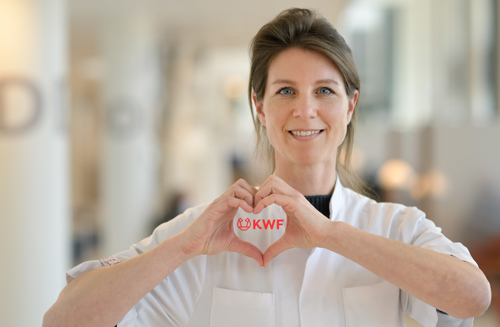Eight research groups Netherlands Cancer Institute to receive Dutch Cancer Society grants
13 Apr 2021 16:59
The Dutch Cancer Society (KWF Kankerbestrijding) has awarded grants to 8 teams at the Netherlands Cancer Institute. The money, amounting to a total of 5 million euros, will help fund their research into treatment for breast cancer and liver metastases, and more. We will highlight three of these projects on this page (find a full overview of the research projects below).
Detecting breast cancer with MRI
Radiologist Ritse Mann is developing a ‘smart MRI’ for faster breast cancer diagnostics. In his research project, he is working on the development of an algorithm that can detect breast abnormalities quickly during the MRI scan. If no abnormalities are detected, the MRI procedure can end. This means that the average examination time for women will be a maximum of 3 minutes instead of the current 20 minutes; the scan will only take this long for a select group of women. This saves a lot of time and opens up the possibility of examining larger patient groups, making MRI a potential method for breast cancer screening, the early detection of the condition.
Why do cancer cells sometimes produce aberrant proteins?
Fundamental researcher Reuven Agami wants to use his research to expose vulnerabilities of cancer cells which may lead to new therapies. Last year he showed that melanoma cells develop a deficiency of the crucial nutrient tryptophan in their move to circumvent the immune system. A healthy cell would immediately halt protein synthesis, but melanoma cells continue their production in full force. However, this process is very sloppy and leads to aberrant proteins. Thankfully the immune system can detect them, which may pave the way for a new type of immune therapy. Agami: “We see this kind of sloppy protein production in approximately 60% of all tumors; not just in melanomas but also in other cancer types. But not in the remaining 40%, nor in healthy cells. Why is that?” This is what he intends to find out through his Dutch Cancer Society grant. “Once we know how this works, we can take control and maybe develop a new kind of immunotherapy that makes use of this cancer-induced sloppiness.”
Better treatment for metastases
Metastases are a big problem for patients with, for example, colon cancer. Approximately half of them develop liver metastases. If these metastases are limited in number, treatment can still be curative. Surgery is the current standard treatment, although alternatives are currently in development – like precision radiation treatment using stereotactic radiotherapy (SBRT). SBRT causes fewer side effects than surgery, but the treatment’s current results vary.
Radiation oncologist Marlies Nowee will conduct research into MRI guided SBRT for liver metastases at the Netherlands Cancer Institute. Nowee: “This MRI guided treatment is only available in a few places in the Netherlands. By gathering a lot of data and further developing this technique, our research project may be able to improve the results for our patients.”

Complete list of projects funded by the Dutch Cancer Society in this round
|
Research project |
Project leader |
Budget |
|
Towards minimal invasive breast cancer treatment |
Theo Ruers |
703.272 |
|
Towards personalized MRI-guided radiotherapy for liver oligometastases |
Marlies Nowee |
612.455 |
|
Dissecting how eosinophils enhance immunotherapy response of metastatic breast cancer |
Karin De Visser |
619.190 |
|
Cancer tReAtment During pregnancy: addressing the Last concerns of its fEtal safety (CRADLE-II) |
Frederic Amant |
474.971 |
|
Cancer-induced Sloppiness in protein production |
Reuven Agami |
818.456 |
|
AI-based adaptive breast MRI, to optimize throughput and accuracy |
Ritse Mann |
674.104 |
|
Harnessing the tumor immune microenvironment in the context of pro-senescence therapy: a novel therapeutic approach for liver cancer. |
Serena Vegna |
639.649 |
|
Phase 2 clinical study to assess efficacy of Induction ipilimumab/nivolumab to spare the Bladder in urothelial bladder cancer (IndiBlade) |
Michiel Van der Heijden |
510.828 |
|
|
|
|
|
Research project led by other institutes |
In project team |
Budget |
|
A new era in the treatment of patients with familial adenomatous polyposis: on the way to personalized care |
Monique van Leerdam |
820.705 |
|
Influence of perioperative testosterone levels on functional and oncologic outcomes after radical prostatectomy (ENFORCE) |
Pim van Leeuwen |
818.183 |
|
Disabling of two new proteins as a novel therapy to kill BRCA mutant tumor cells |
Jos Jonkers |
756.971 |
 nl
nl
 Nederlands
Nederlands